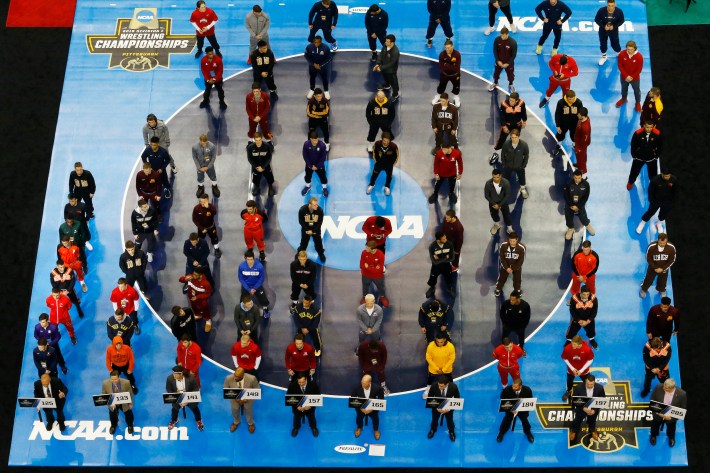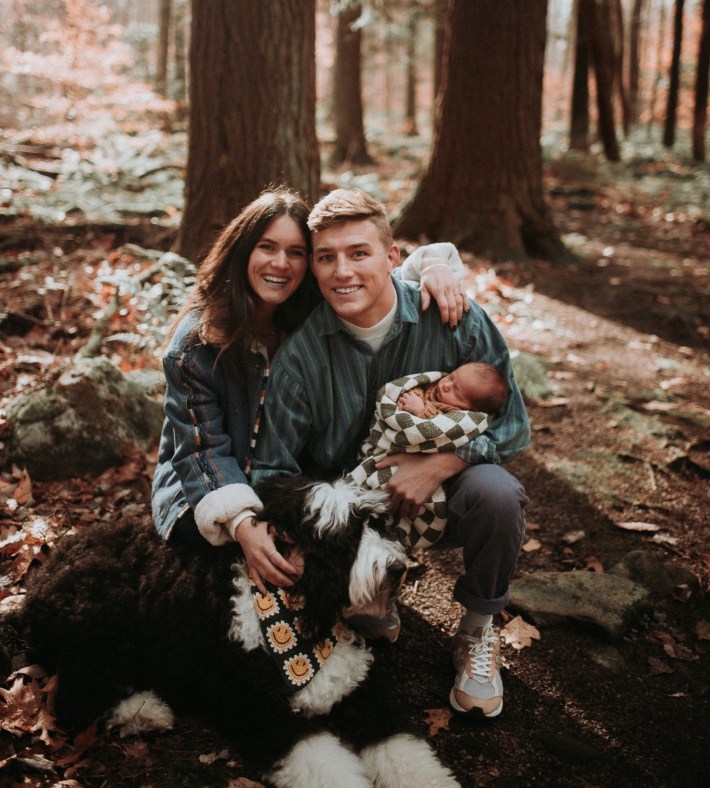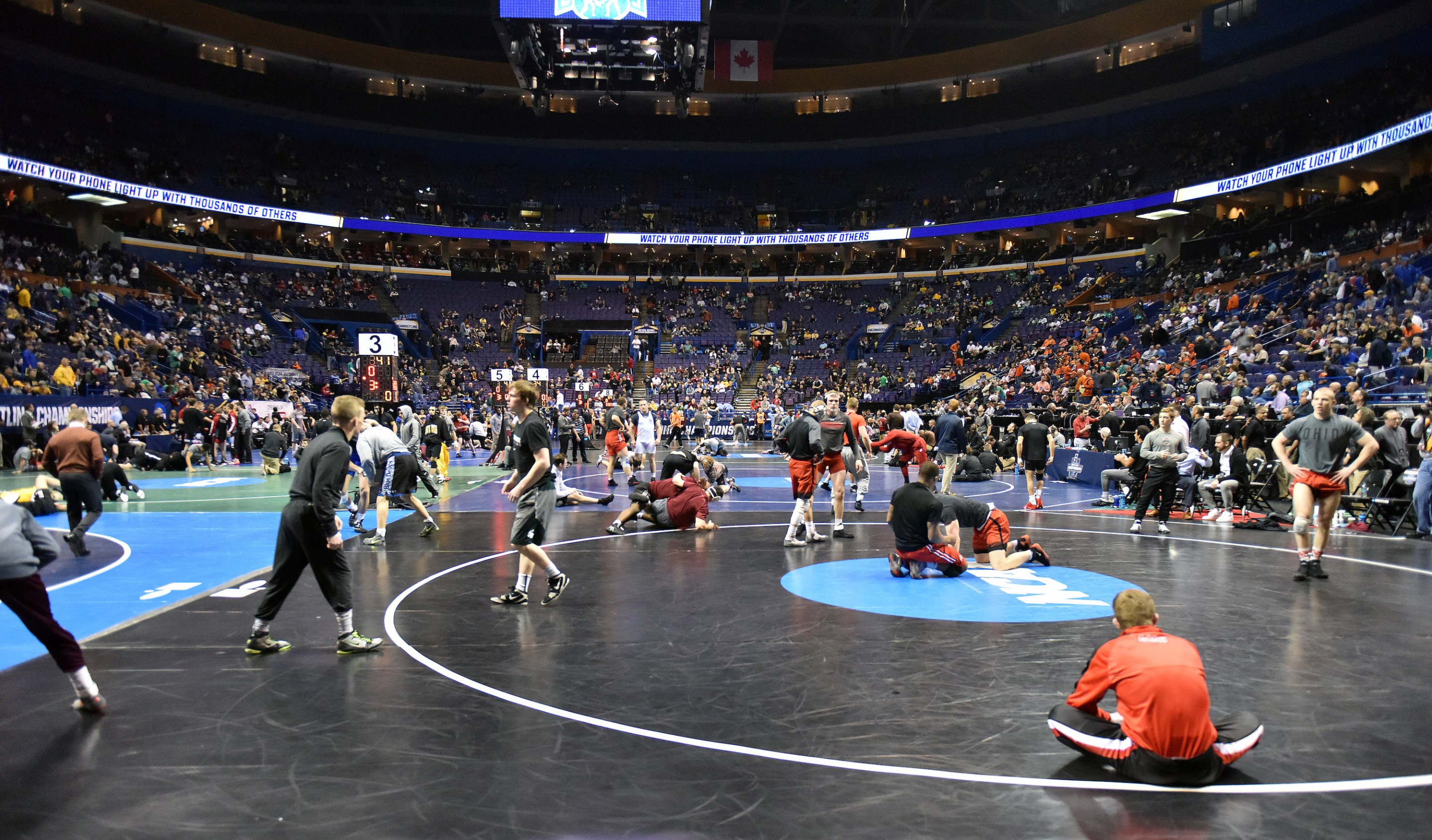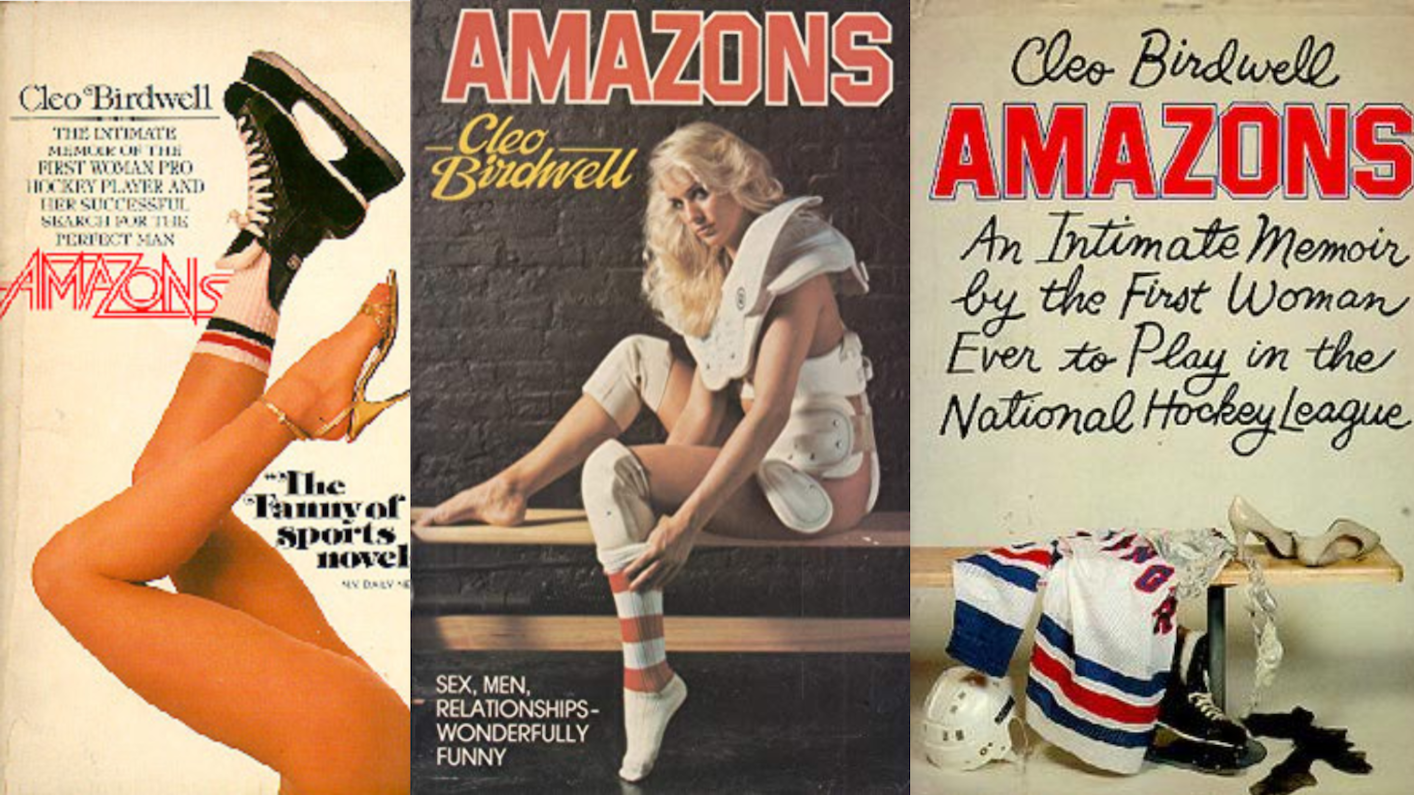Micky Phillippi knows a little bit about the blood round. He was in it four times. Since his childhood, the former 133-pound wrestler for the University of Pittsburgh knew what was at the end of that path. The blood round was an opportunity to mean something in college wrestling, to not let one loss define your season. In those four trips, Phillippi felt the chaos, the pressure, and the pain.
“There's so many people. It's so loud," Phillippi, who wrestled in college from 2016 to 2023, said of his experience. "The music's going, the mats are so crowded that you can barely even wrestle on them to warm up, because there's not that much space. You’re trying to get your space and trying to jog without hitting somebody … and it's just dodging and weaving every five seconds to make sure you have that good warmup in.”
The blood round in Division I wrestling is made up of the consolation matches that occur Friday night in the annual NCAA Wrestling Championships, after the championship match has already been set. This is when the rest of the pack, desperate and hungry, compete for the only prize remaining.
A national title reigns supreme, but many wrestlers spend their whole career chasing a different and slightly more attainable accomplishment. Anyone who finishes in the top eight of their respective double-elimination brackets is an NCAA All-American. The recognition is widely coveted; Division I programs adorn their walls with names, photographs, and sometimes lithographs of NCAA All-Americans. That's why the blood round is so intense: Every wrestler in it has nothing to lose. Years from now, nobody will remember whether you took fourth, fifth, or eighth. What matters is the "AA" next to your name.
“Going into the blood round … you know one way or another that 10 minutes from now, I’m gonna have something that I’ll remember for the rest of my life," said Mason Beckman, a two-time All-American for Lehigh University. “When you win, it’s the realization that you are going to be on that [All-American] wall forever. You are immortalized.”
Where Beckman found success, Phillippi found heartbreak. Since the tournament expanded in 1979, he is the only D-I wrestler to lose in the blood round four times, according to research from wrestling journalist Jason Bryant.
Phillippi, like most wrestlers who compete at the D-I level (about 1 percent of all high school wrestlers), began wrestling nearly as soon as he could walk. Growing up in Derry, Penn., Phillippi rose to the top of the heap, won three Pennsylvania state titles and at one point ranked as the No. 2 recruit in the country.
The youngest of five siblings, Phillippi did not come from a family of wrestlers. His older brother had wrestled for a short stint in high school, but Phillippi was the first to fully embrace the sport.
“My dad wanted me to play basketball 'cause he played basketball," Phillippi said. "And I was like, I kind of want to beat someone up. Whenever I was a kid, I would come into school with a little black eye. I thought it was cool. But the teachers were like, 'What the heck's going on with you at home?'"
By the time he was in kindergarten, Phillippi was already enrolled in multiple wrestling clubs around the Pittsburgh area. From an early age, Phillippi associated the All-American status with success. His father Steven would take him to summer camps headlined by some of the best college wrestlers in the U.S., many of whom had earned their AAs. For Phillippi, that meant "this dude's a big deal." He wanted to be a big deal, too. But he also said that his family struggled to afford the clubs and camps necessary to compete at such a high level. Nonetheless, his dad made it work.
“My dad was working off my practices with the coach," Phillippi said. "He’d go to their house [to] chop firewood, do whatever he could do in order for me to go to practice.”
By the time Philippi was poised to enter high school, he had already become one of the premier wrestling talents in the state. Then, in 2012, Steven died suddenly. Phillippi was devastated. In his quest for his first state title that season, his father's death was in the back of his mind. He said one of his fondest memories of his career was celebrating that championship with his family in the stands.
“Everyone is sobbing and excited and it's like … I felt like I kind of helped the situation. I won," Phillippi said. "Like, Micky's doing good, you know."
After his high school career, Phillippi went to Virginia, then transferred to Pittsburgh after the 2016-17 season. Although he lost a year due to transfer rules, Phillippi was in position to be an All-American in his first year of eligibility with the Panthers. In the 2018-19 season, Phillippi entered that year's NCAA tournament as the fourth seed, with a 21-4 record. He described his first trip to the Wrestling Championships as "absolute chaos."
Collegiate wrestling's version of March Madness is brief and intense. The tournament is packed into a three-day span, awarding individual championships, as well as a title to the team with the most points at the end. Wrestlers compete simultaneously across eight different mats for a chance at a national title. In the stands, sections of fans adorned in their school colors can create a checkerboard effect. One section might break into a frenzy of boos at a missed takedown call on Mat 2, while another might celebrate an overtime victory on Mat 8. Over the course of 72 hours, eight mats turn into four, and four turns into one. The field of competition is whittled down until a national champion is crowned for each of the 10 weight classes.

During the matches in progress, Phillippi and the rest of the field would wait patiently in the bowels of the arena, doing whatever they could to stay composed while the unseen crowd roars directly above them. Computer screens inform wrestlers when they are “in the hole.” Once the signal is given, wrestlers make their way to the tunnels, where they wait to take the mat. The tunnels are where a wrestler can warm up as their coaches keep them loose and fill their ears with motivation. As each wrestler prepares for their moment, their opponent is doing the same thing, often within arm's reach in the same tunnel.
Meanwhile, the fallout of previous matches drifts through the tunnels. The highs and lows of young men who have hung their life dreams in the balance.
“You're watching some kids come out bawling their eyes out," said Archie Colgan, a former Big 12 champion for the Wyoming Cowboys, and my former teammate. "You're watching some kids, super excited, slapping the shit out of their coaches' hands, just fired up. You're getting some people's energy that's super high because they had just won, and then you're also getting that other kid who's walking out right behind him or before him, who's in a whole different world than that other guy was."
In Phillippi’s first run at an NCAA title in March 2019, things started well. He opened the tournament with a narrow 4-2 win, followed by a razor-thin 1-0 decision in the round of 16. Then Phillippi ran into Ohio State's Luke Pletcher, an old high school rival, in the quarterfinals. After a tightly contested match, Pletcher won, 3-1.
“I was definitely crying,” Phillippi said of his reaction to the loss. "I was squatted down with my hands, my head, and then shook his hand, ran off the mat, [to] get to the back.”
Like other individual sports, a loss in wrestling is personal; there is no one else to blame. And as the matches add up through the tournament, season-long injuries are aggravated, and new ones are created. For Colgan, it was a torn thumb ligament from early in the season that rendered him unable to grip in his 2017 tournament run, which ended with an overtime blood-round loss.
“My thumb [was] in so much pain … I can't close my hand or anything,” Colgan said, though he did not blame his loss on the injury. “That's the wrestling mindset—what am I going to do, sit here and say my thumb stopped me from being All-American? I had won a lot of matches with that same hurt thumb. It definitely hindered me, but I'm not gonna sit here and pity-party myself on my fucking thumb.”
When asked about whether he ever competed in the tournament with an injury, at first Phillippi initially shook his head. But a few moments later, he said he had torn his ulnar collateral ligament early in his first year at Pitt.
"It’s still not the same," Phillippi said. "With pullups, it just doesn't feel great. It never will be the same, you know? But there's things you can wrestle through and things you can't wrestle through. It's crazy. It's kind of barbaric, but it's just the way it goes.”
After dropping a match to Pletcher, Phillippi had to regroup. A loss might have ended his first run at a national title, but he still had the blood round.
“You're just like, All right, that first match didn't go as planned, right?” said Patrick Pitsch, a former Arizona State wrestler, Pac-12 champion, and three-time blood-round competitor. “My whole plan is out the window, but just like anything, you adapt, right?"
Phillippi said he tried to ignore the pressure of the blood round later in the day, but his loved ones put it front and center. As he prepared for his match against Penn State's future two-time NCAA champ Roman Bravo-Young, his phone was ringing off the hook.
“Everyone's like, 'He's in the blood round, he's in the blood round,'" Phillippi said. "I have these random people calling me; they're saying good luck. I barely know them, you know, and I'm just like, 'Thank you.' But I really need to turn my phone off and get away from them."
Phillippi found himself in another close match. After a scoreless first period, he attempted an outside trip that was countered by Bravo-Young. The Pitt wrestler would escape and spend the entirety of the third period attempting to take a lead. Down 4-3 to Bravo-Young in the final seconds, Phillippi finally found himself in deep on a single leg takedown, but couldn't finish it.
“I was still on the leg when time ran out, and I just couldn't bring it. Couldn't get it in," Phillippi recalled. "I was absolutely devastated. I've never been to a tournament in my life where I didn't place.”
Colgan's experience in the blood round was more emotionally intense. “I'm just like in the back, just lifeless, crying. [Singlet] straps down, just sitting there,” he said of the moments after his 2017 OT loss. “It's a concrete floor. I’m just laying there, and then I switch positions from laying on the floor to laying against the wall. And [I'm] just smacking my head against a concrete wall.”
For Pitsch, the aftermath of his final blood-round loss in 2007 served as a reminder of the NCAA's unforgiving policies.
“I remember just being so upset," Pitsch said. "I'm crying … and some fucking guy just walks over. They give me this slip and they're like, 'Hey, you got to come with us, you got pulled for a random drug test.’ I'm fucking furious. I don't want to take this drug test because I said, 'What does it matter, I'm out of the tournament?'
“I walked back there, and every one of us that's back there, all of us, lost in the [blood] round … trying to take a drug test after that blood round, when you're already dehydrating. There must be five of us standing in a shower naked, trying to pee.”
In his final season, Phillippi would put together a 16-5 record that earned him the No. 9 seed at the tournament. In the opening round, he rattled off a 5-2 win. In the round of 16 against then-Minnesota wrestler Aaron Nagao, the pain returned once more. Midway through the first period, Phillippi took a shot at Nagao’s legs, and the two found themselves in a flurry of action.
“I shot in on a nice shot. Low single, we start rolling, and I get caught with my knee in a really weird position," Phillippi said. "I think I might've tore something in there, only 'cause it hurt really bad afterward. There was no fight. As much as I wanted to fight, I was stuck.”
Nagao pinned Phillippi, and the chance at a national championship was gone. “I really, really expected nothing less than winning the whole thing," Philippi said. "And when I lost there, I did think, Here we go again.”
For the fourth time, Phillippi dropped to the wrestlebacks. After picking up two wins Friday morning, he once again reached the blood round. “I was thinking, Shit, I got to do this," he said. "If I don't win that match, I'm not going to even get on the podium.”
As Phillippi stepped onto the mat to face Virginia Tech's Sam Latona, an opponent he beat in double overtime earlier that season, he said he could feel the moment catching up to him. “It was like one of these moments where my feet just felt like they were heavy." For his final appearance in the blood round, Phillippi lost to Latona, 5-1. Time had run out.
“I was losing my mind—I’m crying, I don't want to talk to anyone," Phillippi recalled. "And I go and grab my stuff, and I just run outside. It was raining—I think I walked the whole way back to the hotel in the rain.”
After briefly saying hello to his wife Marissa and his family, Phillippi said he disappeared into his hotel room for the rest of the evening, and dwelled on the end of his career. In the morning, Marissa called and asked to get breakfast. Phillippi said he declined, but after some convincing, he came out of his solitude. Marissa brought him back to their rental, where she broke the news.
On the bed, Marissa had displayed a pregnancy test and baby clothes. One day after Micky Phillippi had fallen short of what he had characterized as his life’s purpose, he had a new challenge.
“So I'm like, 'You know what? I don't have a chance to really be devastated, because now I gotta set up my family," he said. "I have a new chapter.”
Today, their son is almost five months old. Phillippi works as the operations coordinator on the wrestling team at Brown University. When asked about his trials in the blood round, Phillippi admitted that the pain from defeat never fully goes away, and that he’s reminded of it in the unlikeliest places: from the older guys at the bar, or while watching his nephew wrestle at a tournament recently. But even though Micky Phillippi didn't get that "AA" next to his name, he insisted that those losses taught him a lot about himself.
“They built me," Phillippi said. "I mean, they made me set for life because I've had a lot of pain in those moments. It feels like the whole world has crumbled on you. You always have another chance to get back up. And when you put everything you have into something, and it doesn't happen, that's hard, but there is a bigger picture here, you know? I'm in such a different place mentally now. I have a baby, and I have a wife. I'm coaching. I'm living the dream that I've always wanted.”







